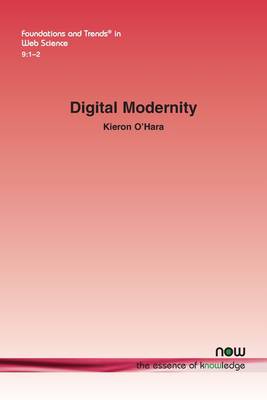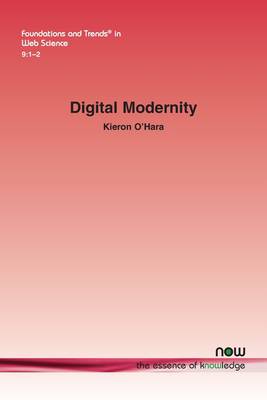
- Retrait gratuit dans votre magasin Club
- 7.000.000 titres dans notre catalogue
- Payer en toute sécurité
- Toujours un magasin près de chez vous
- Retrait gratuit dans votre magasin Club
- 7.000.000 titres dans notre catalogue
- Payer en toute sécurité
- Toujours un magasin près de chez vous
134,45 €
+ 268 points
Description
Modernity is a social, cultural, or historical descriptor for a certain type of society or set of social arrangements. It is a contentious and disputed term, often understood implicitly. It is a way of describing and classifying highly complex, dynamic, and emergent aggregate social phenomena, and so dramatically simplifies such contexts. However, the language of modernity remains attractive to commentators, academics, and policymakers. In this monograph, the author reviews the literature that characterises what is called digital modernity. Digital modernity narratives focus on the possibilities of the data gathered by an ambient data infrastructure, enabled by ubiquitous devices such as the smartphone, and activities such as social networking and e-commerce. It is characterised by (1) a subjunctive outlook where people's choices can be anticipated and improved upon, (2) the valorisation of disruptive innovation on demand, and (3) control provided by data analysis within a virtual realm that can be extended and applied to the physical world. The author explored the synergies and tensions between these three aspects as well as the opportunities for and dilemmas posed by misinformation. The author identifies five principles that emerge from the study of relevant texts and business models and concludes by contrasting digital modernity with other theories of the 21st century information society. Narratives of digital modernity are useful because they help explain the development of technology. It matters because many influential people accept, and often generate, the digital modernity narrative. Given digital modernity's strong association with the Web, it is a central topic for Web Science as the interdisciplinary study of the World Wide Web from the technological, social, and individual points of view.
Spécifications
Parties prenantes
- Auteur(s) :
- Editeur:
Contenu
- Nombre de pages :
- 268
- Langue:
- Anglais
- Collection :
Caractéristiques
- EAN:
- 9781638281047
- Date de parution :
- 17-11-22
- Format:
- Livre broché
- Format numérique:
- Trade paperback (VS)
- Dimensions :
- 156 mm x 234 mm
- Poids :
- 381 g







